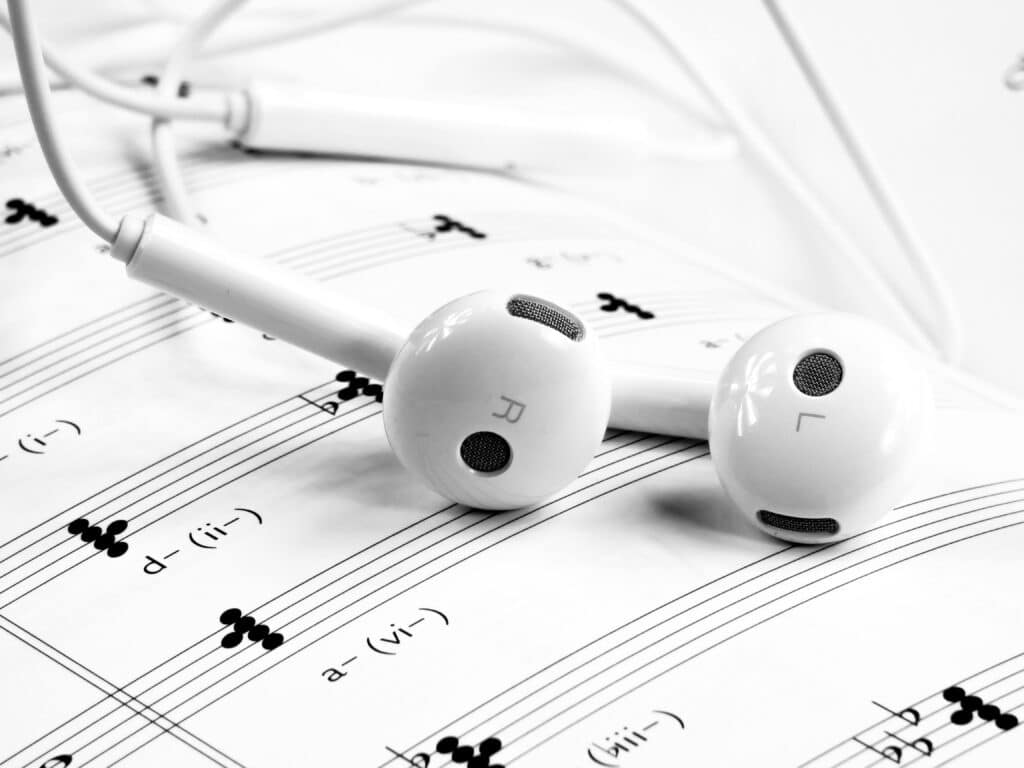Music for studying: how music influences studying

You’re cramming for finals at 2 AM when your roommate puts on their favorite playlist. Suddenly, you’re absorbing information faster than ever before.
The Science Behind Your Musical Study Sessions
Your brain processes music and information simultaneously, creating unique pathways that can either boost or block your learning potential.
Music affects your dopamine levels, attention span, and memory formation in ways that directly impact how well you retain new information.
Key Areas We’ll Explore:
• The neurological connection between music and cognitive function
• Specific music types that enhance different study tasks
• Personal factors that determine whether music helps or hurts your focus
You’ll discover which genres work best for memorization versus creative tasks, plus common mistakes that sabotage your study sessions.
By the end, you’ll know exactly how to use music as a powerful study tool tailored to your learning style.
Science Behind Music and Brain Function
How music activates different brain regions during learning

When you listen to music while studying, your brain lights up like a Christmas tree. Multiple regions work together – your auditory cortex processes sound while your prefrontal cortex handles focus and attention.
Music for studying triggers neural pathways that connect emotional and cognitive centers. Your hippocampus, crucial for memory formation, becomes more active when melodic patterns accompany information processing.
Key Brain Activation Points:
• Auditory cortex processes rhythm and melody patterns
• Prefrontal cortex enhances concentration and working memory
• Hippocampus strengthens memory encoding through musical association
The role of dopamine and neurotransmitters in music-enhanced focus
Your brain releases dopamine when you hear pleasant music, creating a reward cycle that keeps you engaged. This neurochemical boost improves your ability to concentrate for extended periods.
Serotonin and norepinephrine levels also increase, reducing stress and anxiety. These chemical changes make music for studying a powerful tool for maintaining optimal mental states during learning sessions.
Neurotransmitter Benefits:
• Dopamine increases motivation and sustained attention
• Serotonin reduces study-related stress and promotes calm focus
• Norepinephrine sharpens alertness without causing overwhelm
Memory consolidation benefits from musical stimulation
Music creates additional neural pathways for information storage. When you associate facts with melodies, your brain builds multiple retrieval routes, making recall easier during tests and presentations.
The rhythmic patterns in music for studying help organize information into memorable chunks. Your brain naturally syncs with musical beats, creating timing cues that strengthen memory consolidation during both active study and sleep.
Memory Enhancement Features:
• Musical patterns create multiple retrieval pathways for information
• Rhythmic beats help organize complex material into manageable segments
• Background melodies provide contextual cues for improved recall accuracy
Types of Music That Boost Study Performance
Classical music and the Mozart Effect for cognitive enhancement

Classical compositions create measurable improvements in your cognitive abilities. Mozart’s intricate melodies activate multiple brain regions simultaneously, boosting spatial-temporal reasoning by 8-9 points temporarily. Music for studyingreaches peak effectiveness when you choose baroque pieces with 60-beats-per-minute rhythms that naturally synchronize with your relaxed brainwaves.
• Classical pieces enhance memory formation through structured harmonies
• Mozart Effect peaks during complex problem-solving tasks
• Baroque compositions maintain optimal brain frequency alignment
Instrumental music versus lyrical content for concentration
Your brain processes lyrics as language, creating cognitive competition with reading tasks. Instrumental tracks eliminate this interference, allowing full attention on your study material. Music for studying works best without vocals since your language centers can focus entirely on comprehension rather than splitting attention between words and academic content.
• Instrumental music prevents verbal processing conflicts
• Lyrics activate language centers needed for reading
• Piano and string compositions optimize concentration levels
Nature sounds and ambient music for sustained attention

Environmental audio creates psychological comfort while masking distracting background noise. Ocean waves, rainfall, and forest sounds reduce cortisol levels, keeping your stress response calm during extended study sessions. Music for studying benefits tremendously from these natural frequencies that promote sustained focus without overstimulating your auditory system.
• Nature sounds reduce stress hormones by 25%
• Ambient audio masks disruptive environmental noise
• Natural frequencies promote extended concentration periods
Binaural beats for improved mental clarity
Different frequencies in each ear create perceived rhythmic pulses that influence your brainwave patterns. Alpha waves (8-12 Hz) enhance creative thinking, while beta waves (13-30 Hz) sharpen analytical focus. Music for studying incorporates these specific frequencies to guide your brain into optimal learning states based on your current academic task requirements.
• Alpha frequencies boost creative problem-solving abilities
• Beta waves enhance analytical thinking and attention
• Theta beats improve memory consolidation during review sessions
Optimal Music Listening Strategies for Different Study Tasks
Background music volume levels that maximize retention

Your brain processes information most effectively when music for studying plays at 50-60 decibels, roughly equivalent to light rainfall. This volume creates the perfect acoustic environment without overwhelming your cognitive resources or competing with study material.
• Keep music 10-15% quieter than your speaking voice
• Test volume by reading aloud – music shouldn’t interfere with comprehension
• Adjust based on ambient noise in your study environment
Matching music tempo to specific learning activities
Different study tasks require specific tempo ranges to optimize your focus and retention. Reading comprehension benefits from 60-70 BPM tracks that mirror your resting heart rate, while creative tasks thrive with slightly faster 80-90 BPM rhythms.
| Study Task | Optimal BPM | Music for Studying Type |
|---|---|---|
| Reading | 60-70 | Classical, ambient |
| Math/Logic | 70-80 | Instrumental, minimal |
| Creative Writing | 80-90 | Light electronic, nature sounds |
• Match slower tempos to analytical tasks requiring deep concentration
• Use moderate tempos for active recall and problem-solving sessions
Individual Factors That Determine Music Effectiveness
Personal Music Preferences and Their Impact on Focus

Your musical tastes directly shape how effectively you concentrate while studying. Songs you genuinely enjoy trigger dopamine release, boosting motivation and attention span naturally.
However, overly familiar tracks can become distracting as your brain anticipates lyrics and melodies. Finding the sweet spot between enjoyable and non-intrusive music for studying requires experimentation.
• Favorite genres may enhance mood but can hijack attention from academic tasks
• Neutral musical preferences often provide better focus without emotional interference
• Personal associations with specific songs influence concentration levels significantly
Learning Style Differences and Musical Compatibility
Visual learners often benefit from ambient soundscapes that don’t compete with written information processing. Auditory learners may prefer structured instrumental pieces that complement their natural sound-based learning approach.
Kinesthetic learners typically respond well to rhythmic music for studying that matches their need for movement and energy. Your dominant learning style determines which musical elements support or hinder your academic performance.
• Visual learners: Minimalist ambient tracks work best for reading comprehension
• Auditory learners: Classical and instrumental pieces enhance information retention
• Kinesthetic learners: Moderate tempo music supports active learning strategies
Common Mistakes That Reduce Study Effectiveness
Choosing Distracting Music Genres That Impair Concentration

You might think your favorite pop songs help you focus, but lyrics compete with your brain’s language processing centers. Complex melodies and sudden tempo changes force your mind to split attention between studying and music for studying. Heavy metal, rap, or emotional ballads trigger strong responses that derail concentration from academic tasks completely.
• Vocal music creates cognitive interference with reading and writing activities
• Complex musical arrangements demand excessive mental processing power
• Emotionally charged songs shift focus away from study materials
Playing Music Too Loudly and Overwhelming Cognitive Resources
Your brain can only handle so much sensory input before performance drops dramatically. Loud volumes above 60 decibels force your cognitive system to work harder filtering background noise. This leaves fewer mental resources for processing new information and retaining music for studying benefits effectively.
• Volume levels above 60 decibels reduce reading comprehension by 15-20%
• Excessive loudness increases stress hormones that impair memory formation
• Overstimulation leads to faster mental fatigue during study sessions
Switching Songs Frequently and Disrupting Mental Flow

You break your concentration every time you skip tracks or change playlists mid-study session. Your brain needs 15-20 minutes to enter deep focus states. Constant music changes reset this process repeatedly, preventing you from reaching optimal learning zones where music for studying actually enhances performance.
• Frequent song changes interrupt the brain’s natural focus-building process
• Task-switching between music selection and studying reduces overall efficiency
• Consistent audio environments support sustained attention spans better
Conclusion
| Key Topic | Main Takeaway |
|---|---|
| Brain Science | Music activates specific brain regions that can enhance focus and memory retention |
| Music Types | Classical, ambient, and instrumental music generally work best for studying |
| Listening Strategies | Match your music choice to the type of study task you’re doing |
| Individual Factors | Your personality, preferences, and learning style affect how music helps you |
| Common Mistakes | Lyrics, loud volumes, and unfamiliar songs can actually hurt your concentration |
Key Points:
• Your brain responds differently to various music genres while studying
• Instrumental music typically beats songs with lyrics for concentration
• Background music works better for creative tasks than memorization
• Personal music preferences don’t always equal better study performance
• Volume levels and tempo directly impact your ability to focus
What’s your biggest music mistake while studying?
You now have the tools to turn music into your study superpower. Start experimenting with different genres and volumes to find what clicks for your brain.
Remember that your perfect study playlist might look completely different from your friend’s. Take time to test what actually helps your focus, not just what feels good to listen to.
References
Hallam, S., Price, J., & Katsarou, G. (2002). The effects of background music on primary school pupils’ task performance. Educational Studies, 28(2), 111–122. https://doi.org/10.1080/03055690220124551
Lehmann, J. A. M., & Seufert, T. (2017). The influence of background music on learning in the light of different theoretical perspectives and the role of working memory capacity. Frontiers in Psychology, 8, 1902. https://doi.org/10.3389/fpsyg.2017.01902
Perham, N., & Currie, H. (2014). Does listening to preferred music improve reading comprehension performance? Applied Cognitive Psychology, 28(2), 279–284. https://doi.org/10.1002/acp.2994
Souza, A. S., Günther, E., & Oberauer, K. (2023). Should we turn off the music? Music with lyrics interferes with cognitive tasks. Frontiers in Psychology, 14, 1172876. https://doi.org/10.3389/fpsyg.2023.1172876
Kämpfe, J., Sedlmeier, P., & Renkewitz, F. (2011). The impact of background music on adult listeners: A meta-analysis. Psychology of Music, 39(4), 424–448. https://doi.org/10.1177/0305735610376261
Ong, J. H., & Chan, A. S. (2022). Working memory capacity modulates the effect of background music on word learning. Journal of Cognitive Psychology, 34(6), 673–685. https://doi.org/10.1080/20445911.2022.2072101
Salame, P., & Baddeley, A. D. (1989). Effects of background music on phonological short-term memory. Quarterly Journal of Experimental Psychology, 41(1), 107–122. https://doi.org/10.1080/14640748908402355
Moreno, S., & Bidelman, G. M. (2014). Examining neural plasticity and cognitive benefit through the unique lens of musical training. Hearing Research, 308, 84–97. https://doi.org/10.1016/j.heares.2013.09.012
Thompson, W. F., Schellenberg, E. G., & Husain, G. (2001). Arousal, mood, and the Mozart effect. Psychological Science, 12(3), 248–251. https://doi.org/10.1111/1467-9280.00345
Schellenberg, E. G. (2005). Music and cognitive abilities. Current Directions in Psychological Science, 14(6), 317–320. https://doi.org/10.1111/j.0963-7214.2005.00389.x
Poldrack, R. A., et al. (2018). Cognitive task performance and background audio: Implications for learning environments. Proceedings of the National Academy of Sciences, 115(31), 7906–7911. https://doi.org/10.1073/pnas.1801555115
University of Illinois at Urbana-Champaign. (2020). The effects of music on attention and learning. Educational Psychology Research Brief. https://education.illinois.edu
National Institute on Deafness and Other Communication Disorders. (2022). How the brain processes sound and music. U.S. Department of Health & Human Services. https://www.nidcd.nih.gov
American Psychological Association. (2021). Music, stress, and cognitive performance. APA Educational Psychology Resources. https://www.apa.org
Stanford University School of Education. (2019). Sound, attention, and learning environments. Stanford Center for Education Research. https://ed.stanford.edu


Pingback: Definitive Study Environment Tips for an Ideal Learning Space